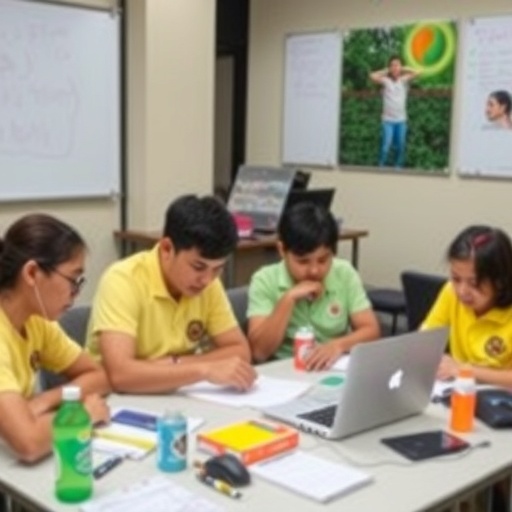In the rapidly evolving landscape of education, particularly within the realm of technical-vocational education (TVET), there is an ever-growing necessity to enhance the research capacity of educators. A groundbreaking study conducted by M.G.R. Lugo in Davao Oriental, Philippines, sheds light on this pressing issue, focusing on the capacity-building of faculty through participatory action research. This academic inquiry not only addresses the need for faculty development but also exemplifies how educational advancements can be fostered through collaborative efforts.
The study underscores the significance of enhancing research capacity among educators in the technical-vocational sector. This research delves into the participatory action research methodology, establishing a framework whereby faculty can engage in an iterative process of reflection and action. By doing so, the study aims to empower educators to raise questions about their educational practices, analyze their effectiveness, and ultimately enhance their instructional methodologies.
One of the core aspects of this research is the acknowledgment of the unique challenges faced by technical-vocational educators. These challenges often stem from the practical nature of vocational training, where hands-on skills are prioritized over theoretical knowledge. The study proposes that by integrating research into the teaching fabric, educators can develop a more comprehensive understanding of their students’ needs and how to best address them.
Moreover, the participatory action research conducted by Lugo fosters a spirit of collaboration among faculty members. Instead of operating in silos, educators are encouraged to work together, sharing insights and strategies that can lead to improved teaching practices. This collaborative approach not only reinforces camaraderie within the educational community but also creates a more robust professional learning environment.
Central to the success of Lugo’s research is the engagement of faculty in the research process itself. By actively involving educators in identifying problems, formulating research questions, and analyzing data, the study cultivates a sense of ownership over the professional development journey. This participatory stance is vital, as it encourages faculty to be proactive in their learning, rather than passively receiving information.
In addition to building research capacity, the study emphasizes the importance of context-specific solutions. Each technical-vocational institution has its own distinct set of challenges and opportunities, shaped by the local socio-economic landscape. Lugo’s research serves as a reminder that generalized solutions may not always be applicable; instead, there is a need for tailored strategies that respond to the unique educational context of Davao Oriental.
The implications of this research reach far beyond the confines of Davao Oriental. As global educational paradigms continue to shift, the need for innovative approaches to faculty development in technical-vocational education is a common thread across various geographies. The insights gleaned from Lugo’s study can serve as a model for similar initiatives in different regions, emphasizing the adaptability of participatory action research across diverse educational settings.
Furthermore, Lugo’s findings resonate with broader educational trends that prioritize stakeholder engagement. By incorporating the voices and perspectives of all involved parties—including students, parents, and industry partners—the research provides a holistic view of the educational landscape. This stakeholder engagement not only enhances the relevance of the research but also facilitates the implementation of findings in a way that is beneficial to all parties involved.
As we navigate through the complexities of modern education, empirical research, such as that conducted by Lugo, becomes indispensable in informing policy and practice. Stakeholders at all levels can utilize these findings to advocate for the necessary resources and support to bolster research initiatives within technical-vocational education. In doing so, we take a crucial step towards cultivating an academic culture that values inquiry and evidence-based decision-making.
In essence, the lessons learned from Lugo’s participatory action research extend well beyond the immediate environment of Davao Oriental. They compel educators, administrators, and policymakers to rethink their approaches to faculty development and research capacity-building. This study not only challenges the status quo but also ignites a conversation around the vital role that research plays in enhancing educational practice.
As we move forward, it becomes clear that investing in the professional development of educators in technical-vocational settings is a multifaceted endeavor. It requires not only training and resources but also a systemic shift in how we perceive and implement faculty development initiatives. Lugo’s research sets a precedent for future investigations that will undoubtedly shape the future of technical-vocational education, driving transformation in our educational systems which is critically needed in the contemporary world.
In conclusion, the study by M.G.R. Lugo serves as a pivotal resource in advancing the discourse on educational practices in technical-vocational settings. By focusing on participatory action research, this investigation illustrates the profound impact that collaboration, reflection, and context-specific solutions can have on enhancing faculty research capacity. As we look to the future, it is imperative that we continue to support such initiatives, ensuring that educators are equipped with the skills and knowledge necessary to navigate the ever-changing educational landscape.
Ultimately, it is through research and dedicated efforts toward faculty development that we can hope to elevate technical-vocational education, inspiring the next generation of skilled professionals who will contribute meaningfully to society. Lugo’s study marks an important step in this ongoing journey, paving the way for innovative educational practices that truly meet the needs of students and communities alike.
Subject of Research: Enhancing technology research capacity in technical-vocational education through participatory action research.
Article Title: Enhancing technology research capacity in technical-vocational education: a participatory action research study of faculty development in Davao Oriental, Philippines.
Article References: Lugo, M.G.R. Enhancing technology research capacity in technical-vocational education: a participatory action research study of faculty development in Davao Oriental, Philippines. Discov Educ 4, 509 (2025). https://doi.org/10.1007/s44217-025-00959-9
Image Credits: AI Generated
DOI: https://doi.org/10.1007/s44217-025-00959-9
Keywords: Technical-vocational education, participatory action research, faculty development, research capacity, education reform.




